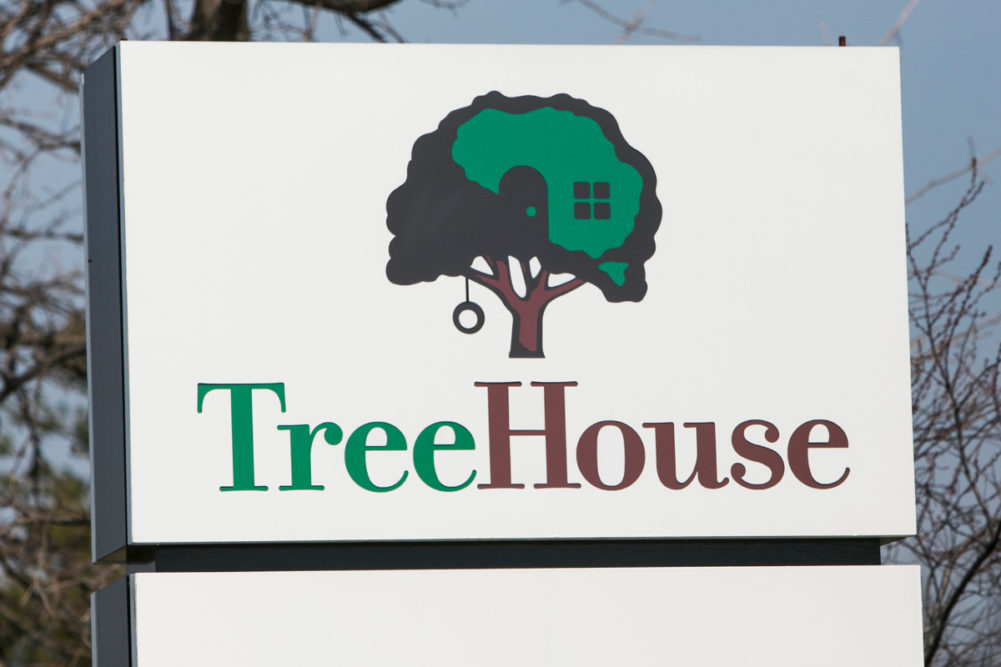OAK BROOK, ILL. —The changes TreeHouse Foods management is making to restructure the company to achieve future growth showed up in the private label manufacturers’ fiscal 2019 bottom line. For the year ended Dec. 31, 2019, the company recorded a loss of $361 million, a significant decline when compared with fiscal 2018 when the company lost $64.4 million.
Much of the fiscal year loss, $250.7 million, was attributed to discontinued operations, including the company’s snacks and ready-to-eat cereals businesses. Continuing operations recorded a loss of $110.3 million, which was attributable, in part, to asset impairment and restructuring charges taken during the year.
TreeHouse Foods’ sales for the year fell 6% to $4,288.9 million.
Of additional concern is the volume shortages the company experienced during the fourth quarter. Net income during the period was $15.5 million, equal to 27c per share on the common stock, and an improvement over the same period of the previous year when the company experienced a loss of $13.9 million.
Sales for the quarter ticked down to $1,139.5 million from $1,193.5 million the year earlier.
Steven T. Oakland, president and chief executive officer, told financial analysts during a Feb. 13 conference call that TreeHouse’s quarterly earnings and sales were within the range of company guidance, but that the company experienced a deceleration in private label growth.
“In the fourth quarter, brands invested heavily across the retail landscape in both temporary price reductions and merchandising,” Mr. Oakland said. “That clearly had an impact on private label performance versus our expectations for the last few months of the year.
“Secondly, the beverage division and more specifically, the highly seasonal broth and nondairy creamer businesses underperformed versus our projections for the fourth quarter. When you think back to 2018 and recall that we couldn't produce enough broth to service the demand. In 2018, customers overcompensated for our broth service challenges by overordering, which led our team to build their forecasts based on prior-year demand signals that were exaggerated. As a result of both of these issues, our fourth-quarter volume declined 5% and were sequentially flat.”
Mr. Oakland said he did not see the aggressiveness by branded manufacturers during the quarter as a sign of structural change in the market.
“We don’t see anything changing strategically, but we would expect, from time to time, we’ll have quarters that are — where certain key categories for us, the brands are aggressive,” he said. “I mean that’s just the way that works.”
The volume deceleration may impact TreeHouse’s “pivot to growth.” For fiscal 2020 the company forecast adjusted earnings per share to be in a range of $2.40 to $2.65 and sales will be in a range of $4.10 billion and $4.40 billion.
First-half 2020 revenue is expected to decline 3% to 5% due to approximately $175 million to $200 million in revenue loss from the prior year that will carry over into 2020. Second half 2020 revenue is anticipated to accelerate to 2% to 3% driven by innovation and new business wins in TreeHouse’s Meal Solutions and Baked Goods business units.
William J. Kelley, chief financial officer, estimated TreeHouse Foods is six months behind its previously stated expectations of a pivot to growth. But, he added, changes made in the company’s forecasting capabilities give management a more granular view of the business.
“In comparison to prior years, our 2020 plan is much more robust,” he said. “We pulled together not only a category perspective and supply chain financial plan, but our teams also built a bottoms-up customer demand plan, which is a level of granularity that we never had before integrated business planning or I.B.P.”






